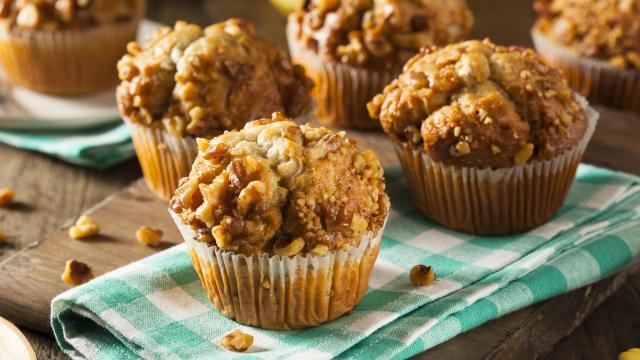My daughter recently asked for chocolate chip pancakes for breakfast on her birthday. Since it fell on a school day and pancakes are never made in my house without substantial emotional drama about the comparative size, quantity and facial composition of said pancakes in relation to those of their siblings (we have an emoji pancake pan), I immediately said no. Pancakes are for weekends.
But I felt bad for refusing my daughter’s pancake wish, so I offered chocolate chip muffins as a consolation, since I could make them the night before. But as I was mixing the batter I thought, well, these would really be better fresh out of the oven. Why go to the trouble to make homemade if they’re just gonna be room temperature or nuked tomorrow?
But, wait. Could I refrigerate the batter and bake them fresh in the morning? I turned to the internet to find out if this would negatively impact the final product (by, I dunno, deflating it? I’m not a food scientist). Turns out, far from ruining the muffins, refrigerating batter can make muffins even better — more like those gorgeously-domed, impossibly poofy muffins you’d buy at a bakery. Here’s why.
What happens to muffin batter when refrigerated overnight?
Letting the batter rest overnight gives its ingredients a chance to better perform as they’re designed. According to The Kitchn, “as muffin batter rests, the starches in the flour have more time to absorb the moisture from the eggs and liquid in the batter. As a result, the starches swell, giving the batter a thicker, more robust consistency.”
The key to making this work: double-acting baking powder. Baking powder (like baking soda) is a leavening agent that helps batters and doughs rise. Comprised of a powdered alkali (sodium bicarbonate, a.k.a. baking soda) and a powdered acid (usually tartaric acid, a.k.a. cream of tartar), when moistened with wet ingredients, the acid and base react to form carbon dioxide gas — inflating cookies and cakes.
It’s called “double-acting” because it reacts and creates gas bubbles twice: once when wet and dry ingredients are combined, and again when it’s exposed to heat. “If your leavening comes from an acid, like buttermilk, and baking soda alone, the bubbles may burst before the batter bakes,” says The Kitchn.
Is your baking powder double-acting? Most likely. You may have never noticed it, but grocery store baking powder will almost always say “double-acting” on the label. (Most single-acting baking powders are only available for commercial use).
How to make bakery-style muffins at home
Next time you want to make muffins, take comfort in the knowledge that it’s actually better to make the batter the night before and save yourself time the next day. Simply make the batter per the recipe, cover, and chill overnight. The next morning, scoop it directly from the fridge into a prepared muffin tin — filling each muffin cup to the top to achieve peak bakery heights. Note: The chilled batter won’t roll off the scooper as easily as room temperature batter. You may want to lightly coat it in non-stick cooking spray or keep your fingers slightly wet to help it glide more easily into the tin. Then sit back, relax, and wait for everyone to be amazed by the unparalleled, professional poof you created. Bakery who?

Leave a Reply
You must be logged in to post a comment.